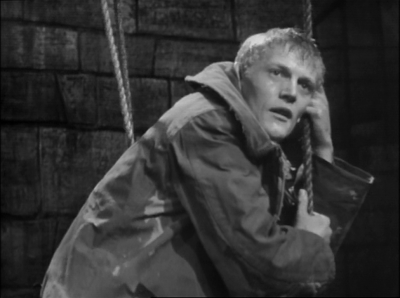Sunday, 17 November 2013
Sunday 17 November 1963
Len Deighton was a true renaissance man of the 60s. Best known for his hugely popular spy novels, he was also a successful graphic designer and food writer - the latter two skills strikingly combined in his "Cook Strips" for the Observer - vivid snapshots of both design and cuisine of 1960s Britain (his recipe for brain soufflé is especially memorable.
But anyway, to the play at hand, which also comes from the pen of Mr Deighton. We start off with the sight of a shabby John Le Mesurier making his way through a rat-infested sewer.
Le Mesurier's character, Harry, lives with the equally down-at-heel Charles (Maurice Denham) in a makeshift underground home they've christened Acacia Avenue/
They spend their time making idle conversation, with Harry reading his seed catalogue and fantasising about a garden of his own, and Charles picking fleas off his stomach and gravely sentencing them to death by candle flame.
Harry announces his eldest daughter is to be married soon, to the private secretary of a prospective cabinet minister. The ceremony's due to be held in Eastbourne, which he talks about like it's some kind of promised land (anyone who's ever been to Eastbourne will realise how deeply depressing this notion is). But these musings are interrupted by the arrival of an interloper: a youngster named Roy (David Andrews, who looks so much like Harry Andrews that they must be somehow related), who asks to stay the night with the elderly pair.
Charles and Harry rapidly find their contented little world disturbed by this unwelcome stranger, who makes fun of Harry's middle class pretensions, steals Charles' jar of boiled sweets, and challenges the vociferous racism the pair direct at the Indians living nearby. Harry's unable to bear it all, and heads off to Eastbourne, but within a few minutes he's back.
With its transparent borrowings from Beckett and Pinter, characters ready to break into a waltz or a music hall routine at the drop of a hat, and an angry young man railing against the state of the nation to his complacent elders, Long Past Glory seems almost like a parody of early 60s British drama. The depths of bathos are reached when Charles and Roy debate whether a flea looks like Karl Marx or Dan Leno.
It's not the sort of play where very much actually happens - until the end, that is. Roy gets a climactic speech condemning British inactivity in the face of the world's problems: "England, it's like a paraplegic old invalid. For years the world has been watching and waiting for her to get off her backside and do something!"
A long silence is finally broken by Charles asking, "How about a boiled sweet?" The search for the boiled sweets, of course, is where it all kicks off, as Charles finds them among Roy's belongings along with a hidden stash of candles and cigarettes. An altercation ensues, with Roy threatening to kill Charles.
Calmly, Harry pulls out a gun and shoots the young man. Of course, this is the sort of play where when someone gets killed they exclaim "You've killed me!" then get an interminable speech about how it feels like to be dying, but when Roy's body does finally plop into the water we find out that this isn't the first person Charles and Harry have done away with.
The twist that ends the play makes the foregoing retrospectively more bearable: it turns out we're not in 1960s Britain at all, but in the trenches during World War I. So perhaps parody of a kind was the intention after all, with Deighton transposing the tropes of contemporary drama to another era. Or then again, with Oh! What a Lovely War enjoying its original run at the time of broadcast, it could be just another modish borrowing.
Labels:
ABC,
Armchair Theatre,
drama,
ITV
Subscribe to:
Post Comments (Atom)













Excellent post and wonderful blog, I really like this type of interesting articles keep it u.
ReplyDeleteToshiba Laptops
You've got a spammer.
ReplyDelete